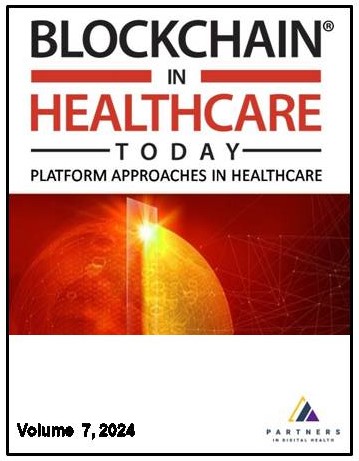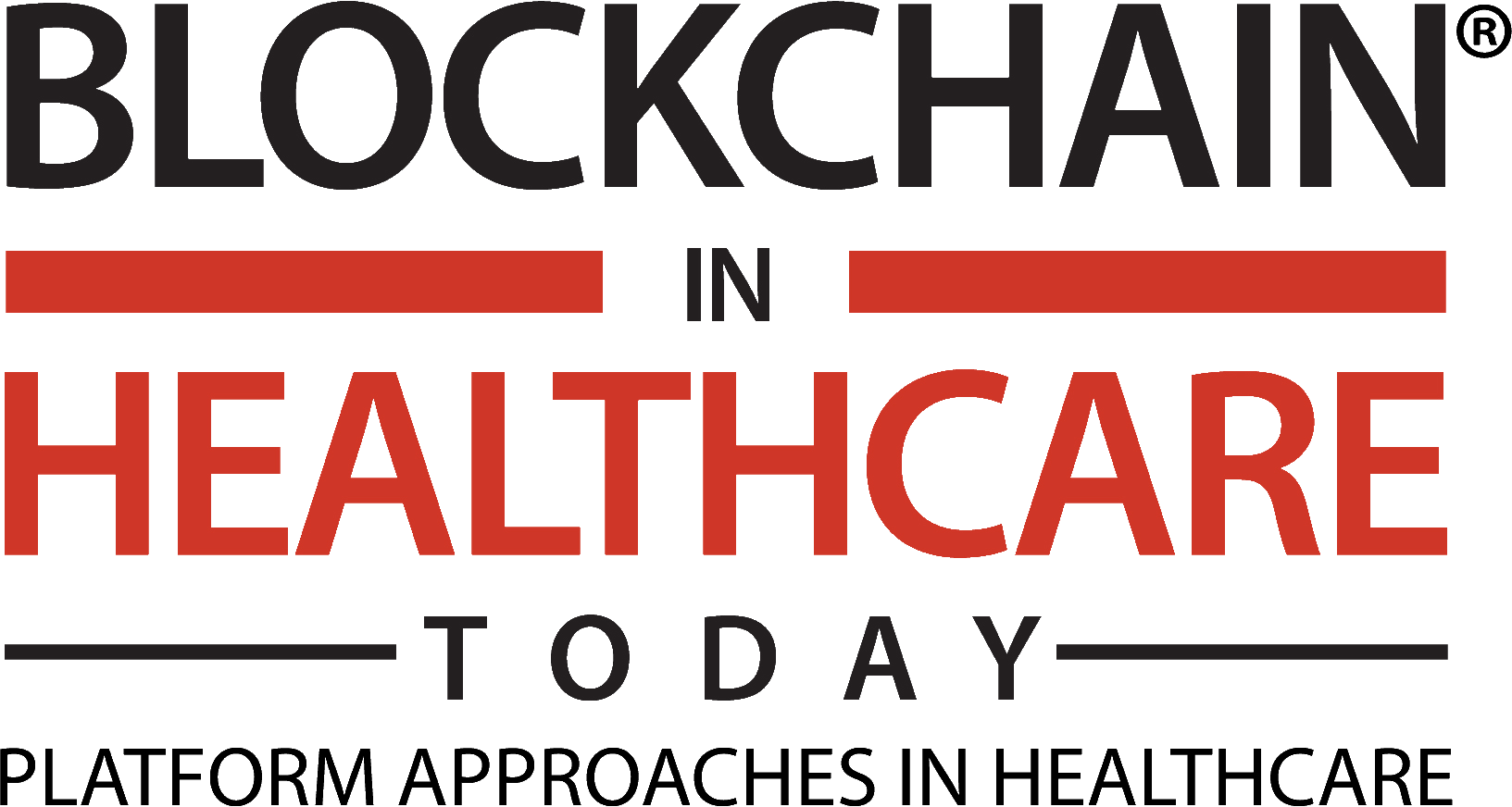Current issue

Volume 7, Issue 3, 2024
Online ISSN: 2573-8240
Volume 7 , Issue 3, (2024)
Published: 16.12.2024.
Open Access
Blockchain in Healthcare Today (BHTY) is the leading international open access journal that amplifies and disseminates platform approaches in healthcare and distributed ledger technology research and innovations. Fields of interest include healthcare information systems, leveraging data science tools and techniques, interoperability, consent mechanisms, privacy preservation, security of health data, clinical trials management, supply chain management, revenue cycle automation, immersive technologies, tokenomics, governance, regulation, network technologies, clinical computing, cryptography, and failed experiments in this expanding specialty field of research.
All issues
Contents
20.04.2024.
Conference Presentations
EHR Systems and Blockchain: Potentials, Challenges and the Road Ahead
Panelists discuss blockchain technology use for electronic health records, and specifically delve into the benefits that blockchain brings to EHRs, but also discuss what its pitfalls and limitations are; including presenting perspectives from academia, and examplesfrom practitioners. Learning Objectives Understand the potential applications of blockchain for electronic health records (EHRs). Explore the benefits and challenges of implementing blockchain for EHRs, including security, interoperability, privacy, and data integrity. Identify key use cases and real-world examples of blockchain implementation in healthcare and EHR management. Analyze the potential impact of blockchain on improving healthcare data exchange, patient consent management, and medical research. Discuss the regulatory and legal considerations associated with using blockchain in healthcare, such as compliance with data protection laws and standards. Examine the role of smart contracts and decentralized applications (DApps) in enhancing EHR management and patient control over their health information. Assess the scalability and performance limitations of blockchain technology in handling large-scale healthcare data and high transaction volumes. Evaluate potential cost savings and efficiency gains achieved through blockchain implementation in EHRs, considering factors such as data access, auditability, and administrative overhead. Discuss the future prospects and challenges of integrating blockchain with existing healthcare systems, standards, and infrastructure to achieve widespread adoption and interoperability.
Jim Poteet, Mike Gault, Anjum Khurshid, MD, PhD, Suresh Sivagnanam, Alex Norta, PhD, Moderator: Horst Treiblmaier, PhD
20.04.2024.
Conference Presentations
Developing a Secure Internet-based Network of Trusted Data
Our world has not caught up with technology, and as a result has become more dangerous and nefarious with clandestine actors. Learn what reputable organizations, businesses and academic pioneers are doing to preserve digital identity, data provenance, universal access, and secure privacy-preserving transactions, to harness socially responsible global data sharing.
Thomas Hardjono, Florence Hudson
31.01.2024.
Conference Presentations
Highlights from Advancing the Business of Health with Blockchain and Frontier Tech at ConV2X Symposium 2023
Tory Cenaj
30.04.2024.
Technical Briefs & Reports
Leveraging Decentralized Clinical Trial Management Systems (dCTMS) to Advance Science: Exploring Challenges related to the Diffusion of Innovation and its Execution
Decentralized clinical trials (DCTs) recently gained attention in research necessary for drug development. While the COVID-19 pandemic proved to be a challenging time in this arena, drug development was a critical area of emphasis in the rapid development of vaccines. DCTs were necessary to allow research activities to occur across many locations. Although the use of DCTs play a pivotal role in reshaping healthcare, as technology expands further into the digital space implementation challenges must be considered. A working group of experts assembled, during an interactive learning exercise at the Conv2X conference (2023), to explore challenges related to the diffusion of innovation among key stakeholders. Common “pain points” of technology and an innovative approach that used a blockchain anchored solution were presented. Experts were divided into three stakeholder groups (patients, payers, and pharmaceutical sponsor) which reconvened for an overall discussion. Several themes, that can be supported by blockchain technology, emerged. These include enhanced efficiencies, patient experience / demographic diversity, data integrity / privacy / security, and cost-effectiveness. Future research may focus on additional stakeholder groups that are less familiar with these technological advances and using technology to increase diversity in study populations.
Rama Krishna R Rao
20.04.2024.
Conference Presentations
Data Economy in Healthcare on Blockchain Technology
The importance of data and digitization in healthcare cannot be overstated. These advancements have the potential to revolutionize the way healthcare is delivered, leading to improved patient outcomes, enhanced efficiency, and better decision-making by healthcare providers. Blockchain technology can play a significant role in addressing the main challenges like data accessibility, privacy, interoperability and patient empowerment, ultimately transforming the healthcare ecosystem into a data-driven economy
Kevin Yavuz
21.04.2024.
Podcast
Blockchain in Health - From Pilots to Mainstream and Implications for AI
Speakers delve into and beyond the previously published BHHTY journal article “Moving Beyond Proof of Concept and Pilots to Mainstream: Discovery and Lessons from Blockchain in Healthcare,” located at https://doi.org/10.30953/bhty.v6.280. This continuous enterprise blockchain technology journey extends the framework and solution assemblies including further developments, with cross over into generative AI and ethics. Objectives Learn specific examples on the economics of blockchain revealing low-hanging fruit for the move from pilots to adoption. Explore concepts such as: Data integrity, minimal data, inter-entity streamlining leading to efficiencies, and what is already possible with tech stack developments and economics in efficiency (in millions) from the previously published BHTY article at DOI: https://doi.org/10.30953/bhty.v6.280 Learn from other verticals to build a framework that is more comprehensive encompassing global perspectives Future proofing and stair-stepping design for an evolving technology – holistic guidance to find and execute the opportunities Obtain a framework for blockchain adoption based on the article. In addition, authors address the academic view of blockchain adoption, and that it is a combination of tech, policy, economics, consumer engagement, and operationalization. Acquire multi-dimensional discovery and specific blockchain constructs including provenance- consensus, trust maps, convergence, dApp human loops, and future proofing /stair-stepping Grasp global perspectives on evolving frameworks with in many verticals and the multi-dimensional nature of blockchain transformation, operationalization, blockchain-enterprise landscape, and AI automation. Gain a better understanding of why is blockchain an essential technology for the future of responsible AI and for scalability of solutions
Sathya Krishnasamy, MS, Badri Gopalakrishnan, PhD, Atul Apte, BSc, MODERATOR: Anjum Khurshid, MD, PhD
20.04.2024.
Conference Presentations
Pioneering New Business Models in Value Based Care
This session will explore the real-world impact value-based procurement and subsequent contracting, and health technology pricing in the context of value-based care. We will delve into innovative business models that are reshaping the healthcare landscape, promoting cost-effectiveness, and enhancing patient outcomes. Attendees will gain valuable insights into the evolving strategies driving value-based care and its implications for healthcare providers, payers, and patients. Learning Objectives Understand the concept of value-based care and its significance in the current healthcare environment Explore the real-world impact of value-based pricing on healthcare delivery and patient outcomes Examine the role of value-based procurement/contracting in driving cost-effective healthcare solutions Gain insights into health technology pricing models and their impact on value-based care initiatives Identify innovative business models that support value-based care and improve patient outcomes
Ahmed Abdulla
17.04.2024.
Original Research
Scalability Performance Analysis of Blockchain Using Hierarchical Model in Healthcare
Blockchain technology has emerged as a pivotal point to enhance privacy and security in enterprise applications and cyber world. However, scalability is an issue researcher are grappling with, in large enterprises, especially in organizations bearing multiple levels of hierarchy and access privilege. Therefore, the existing models and consensus algorithms suffer one way or another. The medical or healthcare sector suffers this problem the most due to the huge amount of data and probably the central point of failure of the traditional database management system. This paper addresses the situation through a hierarchical model in Hyperledger fabric enterprise application through a healthcare sector use case. Multiple organizations are added to each hierarchy considering them as different organization levels (Hospitals, Hospital Governance, and Insurance company). Currently the first implementation has two levels of hierarchy to show networks of hospitals joining an Insurance Company. Our primary experiment revolves around this model to test and enhance the performance of the network. Performance of the model is assessed by varying and scaling environmental parameters such as the number of organizations, transaction numbers, channels, block intervals and block sizes. The benchmarking tool used is Hyperledger caliper to test various indicators such as success and failure rates along with throughput and latency. The current work only tests the scalability of the model with patient data.
Lipsa Sadath, MSc, MCA, Deepti Mehrotra, Anand Kumar
31.08.2024.
Original Research
Soulbound Tokens: Enabler for Privacy-Aware and Decentralized Authentication Mechanism in Medical Data Storage
Context: The digitalization of the healthcare sector faces significant challenges due to the diverse representation of data and their distribution across various hospitals. Moreover, security is a key concern as healthcare-related data are subject to the legal obligations of GDPR and similar data protection legislations. Standardization efforts like HL7 have been implemented to enhance data interoperability. However, authentication still remains a critical issue, even significant challenges. Aim: This research aims to improve and strengthen the authentication process by introducing a novel architecture for decentralized authentication. Additionally, it proposes a new approach to decentralized data management, which is crucial for handling sensitive medical data efficiently. Methodology: The proposed architecture adopts a user-centric approach, utilizing Self-Sovereign Identity (SSI). It introduced a new non-fungible token (NFT) type called Soulbound token (SBT) in the medical context, which will facilitate user authentication across different hospitals, effectively creating a federation of interconnected institutions. Results: The implementation of the proposed architecture demonstrated a significant reduction in authentication time across multiple hospitals. The use of SBT ensured secure and seamless user authentication, enhancing overall system interoperability and data security. The decentralized approach also mitigated the risks associated with centralized authentication servers. Conclusion: The study successfully presents a novel decentralized authentication architecture for the healthcare domain, leveraging SSI and SBTs. This approach not only accelerates the authentication process but also enhances data security and interoperability among hospitals. Future research should explore the scalability of this architecture and its application in other sectors requiring stringent data security measures.
Biagio Boi, Franco Cirillo, Marco De Santis, Christian Esposito
30.04.2024.
Original Research
Emerging Trends in Cybersecurity: A Holistic View on Current Threats, Assessing Solutions, and Pioneering New Frontiers
In an era dominated by digital advancements, cybersecurity plays a pivotal role in safeguarding information and systems from evolving threats. The escalating sophistication of cyber threats necessitates a critical examination of the efficacy of contemporary defenses. Recognizing the limitations and gaps in current solutions, this research introduces a pioneering framework aimed at fortifying cyber defenses. Motivated by a comprehensive exploration of research articles, surveys, online media, and practical studies, this study scrutinizes the intricacies of cyber threats and assesses the strengths and weaknesses of existing solutions. The proposed frameworks emerge from a meticulous feasibility and practicality study, leveraging insights garnered from diverse online sources. The 'how' encompasses a comparative analysis, evaluating the novel framework against established solutions to delineate their respective merits and shortcomings. The impetus behind this research lies in offering valuable insights to researchers, practitioners, and policymakers grappling with the multifaceted challenges of cybersecurity. By navigating through the complexities of existing solutions and introducing innovative frameworks, this paper aims to guide efforts in bolstering cyber defenses. Ultimately, this research envisions a continuous cycle of improvement and evolution in the realm of cybersecurity, as stakeholders collectively strive to adapt to the ever-changing digital threat landscape.
Taskeen, Suman Garai






